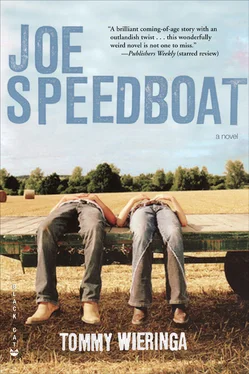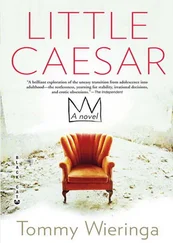Now she responded — by knocking on my door one wet and muddled Saturday morning.
‘I’m not intruding, am I, Frankie? Regina said Joe might be here.’
But Joe was probably out working at Dirty Rinus’s. He had bought a marked-down bulldozer from his employers at Bethlehem Asphalt and was fixing it up. All I knew was that he was planning to enter some race with it. I gestured to P.J. to sit down across from me. Then I saw it: her bottom lip was split. Two stitches held the rip closed, and there was a disfiguring red lump on her chin. My eyes filled with tears of rage, but P.J. shook her head.
‘It looks worse than it is. It was such a sweet card you two sent me. But how are you doing, Frankie? I’ve been hearing lots about you, that you take part in contests? With your arm?’
Arm wrestling , I wrote. The pegs and the square of chalk were still on the table; I assumed the starting position and motioned to her to do the same. She planted her elbow across from mine in the fading box, our hands folded around each other.
‘And now?’
I pressed a little and she pressed back.
‘That’s it?’
I nodded and let go. That was it.
‘No, show me! I want to feel how strong you are.’
She laughed, then winced at the pain in her torn lip. I put my arm back in the box and pressed her with great composure against the tabletop, as though lowering her onto a bed.
‘I couldn’t do a thing,’ P.J. said in amazement. ‘No wonder.’
Tournament in Rostock next week , I wrote. Come along .
‘Rostock? Where’s Rostock?’
Mecklenburg-Vorpommeren, on the Baltic.
The stakes were high at Rostock, and rumour had it that Islam Mansur would be there.
‘That’s where you and Joe are going? Maybe I will come along. I don’t want to go back to Amsterdam, not for a while anyway.’
She laughed again, this time more carefully.
And so it came to pass that Joe and I stopped by the White House on Friday morning to pick up P.J. Her upper lip was a bit less swollen now, the stitches had been removed from the lower one. She was carrying a floppy brown shoulder bag. For a girl, she travelled light. Joe opened the tailgate for her, she climbed in and said good morning to me. Kathleen Eilander came out of the house in a duster shiny with wear, but even in that old rag she was still attractive, her breasts showed only a hint of sag.
‘Take care of my daughter, Joe,’ she said with that strange accent of hers, ‘she’s the only one I have.’
I think Kathleen Eilander sensed that I was staring at her through the window, for she suddenly crossed her arms as though she felt cold. I’d been staring in order to collect material for masturbatory fantasies in the future, and quickly averted my gaze. Kathleen watched us pull away, but didn’t wave.
No one said much for the first few hours. It was hard to tell whether or not it was a painful silence.
‘I’m starving!’ Joe said, once we were well into Germany.
We stopped at a gas station. In the toilet a cleaning lady was mopping the floor, outside the traffic hummed rhythmically across little bumps in the concrete roadway.
‘I ordered Kartoffelsalat with a curry sausage for you,’ Joe said as I slid into the booth. ‘You have to keep your strength up.’
My gaze moved to the glass doors of the fridge beside the counter.
‘Beer’s on its way.’
The man at the table beside us was polishing his cutlery with a napkin. P.J. was in a quiet mood, we couldn’t get her out of it. Joe stood up and went through the swing doors into the petrol station. He came back with a road map of Germany, unfolded it halfway on the table and ran a finger along our route.
‘Hey, a village called Lilienthal, here, close to Bremen. You remember Lilienthal?’
Of course I remembered Lilienthal: Otto, the engineer with wings on his back who had flown a few metres back in the nineteenth century. Joe’s index finger travelled on along the E37, which became the E22 at Bremen, and then on past Lübeck. The Baltic! From there a stretch along the coastline, past Wismar, and then Rostock.
It was late afternoon when we drove into the docklands of Rostock. Darkness had almost settled in. We saw huge ferries, glistening palaces waiting to set sail for Kaliningrad, Helsinki or Tallinn. We drove past supermarkets where Scandinavian passengers were buying cartloads of alcohol and tobacco. Joe turned down a quay and we passed a wall of pine logs leaking tears of sap. The smell was overpowering. At the end of the quay, blindingly lit by huge halogen lamps, a ship full of scrap metal was being unloaded. A mechanical claw bit off chunks of the residue of the industrialized world, out of the hold there came crushed car bodies, refrigerators, wheels and nondescript household appliances. With a sweep of its arm the crane brought the junk on land and dumped it atop an apocalyptic mountain of scrap.
‘Ah me,’ Joe said, ‘look at that: the end of all motion.’
We heard a sound behind us. P.J. was awake: her head appeared between the front seats.
‘Where are we?’ she asked in her sleepytime voice. ‘Oh, wow.’
We watched the salvaging and fantasized about the world coming to an end, a judgment day that nibbled quietly at the back door while up front consumer squandering continued apace, and no one was any the wiser for it. Joe backed up a ways, closer to the wall of pine logs, where we had a view of the next step in the evolution of scrap. Another crane was swinging a magnet the size of a Mini Cooper, using it to pick out chunks of metal and load them onto trucks. As soon as the crane operator turned off the magnetic field, the metal fell into the truck beds with a nasty tearing noise.
Parked on the asphalt flats to our right was a lonesome Trabant with a handwritten sign in the back window: ZUM VERKAUF. A ferry blew three hollow blasts for departure.
We drove on slowly past the docks, trucks stood lined up at attention to one side in massive car parks, along some of the quays we could see the sharp silhouettes of dozens of articulated cranes against a sky full of artificial light. When we stopped and Joe turned off the engine you could hear the blissful sound of diesel motors and generators. We entered that sublime state of mind you encounter whenever you see something grand and massive. P.J. leaned forward.
‘I’m so happy to be here with the two of you,’ she said. ‘I just wanted to say that.’
I stared straight ahead at the black water that glimmered like oil. Joe started the car.
‘Let’s see if we can find that harbour restaurant.’
We drove past Nissen huts, a little power plant and more petrol stations than we’d ever seen in one place. Ost-West-Strasse was easy to find; in fact, it was the main drag along that part of the waterfront, where the Hafenrestaurant was too. Names in this place served only to indicate function. The Hafenrestaurant was a low, rectangular building, with everything on the ground floor. MITTAGESSEN AB 2.50 read the sign in the window, and hanging from the building itself was a neon sign advertising Rostocker Pils. Yes, please.
Inside, under the suspended ceiling with sunken fluorescent lighting, we found two competition tables and a crowd of men. Hardly any women, which meant that suddenly all visual attention surged in aggressive, uncontrolled waves in P.J.’s direction. Most men would broadcast signals of desire upon seeing a woman like her, but in the harbour restaurant it was a tad worse: we were dealing here with truck drivers and seamen, a group that had little contact with the fair sex. Still, P.J. didn’t seem shocked by the hormonal turbulence she caused.
For the first ten minutes or so, after hearing that Islam Mansur wasn’t going to show, I was very pissed off; I had hoped to see the Arm Saint at work, to catch an analytical glimpse of his strategy. But the place was full of Asians, blacks and countless Bohunks, fellows tough as nails, as well as pipsqueaks of whom you wondered how they stood up to life at sea or on the docks. Joe and I knew that we were witnessing something unique: a place at the edge of the world, full of men from every continent who spent their lives circling the globe just to earn their monthly wages. P.J. offered to fetch drinks. In order not to further aggravate the place’s steamy atmosphere, Joe said, ‘No, let me do that.’ I got my Rostocker Pils at last; it even had a straw in it. It had taken us almost nine hours to get here; P.J. was the only one who had slept, Joe and I were running on a jacked-up kind of antsiness.
Читать дальше












